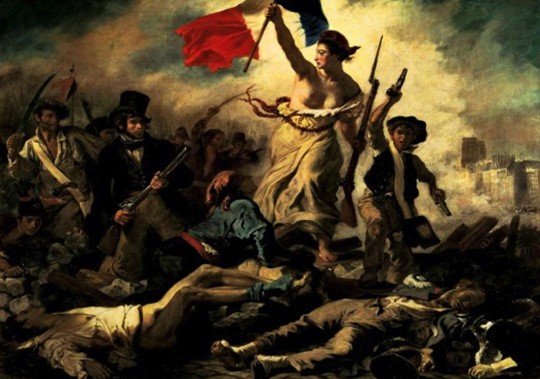 On 14 July, all of France celebrates Bastille Day. On this day in 1789, the infamous Paris prison was stormed by the mob, thus heralding the Revolution and the end of the ancien régime. To honour the occasion, the lovers of French crime fiction within our team have selected the very best Fench crime books for you to try. After all, if you’re not going to sample some French crime fiction on Bastille Day, when are you going to get around to it?
On 14 July, all of France celebrates Bastille Day. On this day in 1789, the infamous Paris prison was stormed by the mob, thus heralding the Revolution and the end of the ancien régime. To honour the occasion, the lovers of French crime fiction within our team have selected the very best Fench crime books for you to try. After all, if you’re not going to sample some French crime fiction on Bastille Day, when are you going to get around to it?
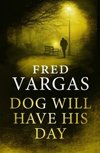 The redoubtable Frédérique Audoin-Rouzeau – better known as Fred Vargas – heads up Andre’s selections. Dog Will Have His Day begins in a wonderfully unsavory fashion, when a down-at-heel former intelligence agent finds a human toe bone in a pile of dog muck. The ensuing tale involves the partial intervention of two of Vargas’s fabled Three Evangelists and showcases that mixture of whimsy and criminal malice that is unique to this author. The game is played out to a conclusion in the tiny Breton fishing village of Port Nicolas. Our full review of the book is here.
The redoubtable Frédérique Audoin-Rouzeau – better known as Fred Vargas – heads up Andre’s selections. Dog Will Have His Day begins in a wonderfully unsavory fashion, when a down-at-heel former intelligence agent finds a human toe bone in a pile of dog muck. The ensuing tale involves the partial intervention of two of Vargas’s fabled Three Evangelists and showcases that mixture of whimsy and criminal malice that is unique to this author. The game is played out to a conclusion in the tiny Breton fishing village of Port Nicolas. Our full review of the book is here.
Buy now on Amazon.
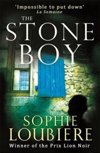 Sophie Loubière is a well-known writer in France, as well as an established radio presenter and scriptwriter, but The Stone Boy is the first of her books to be translated into English. Elsa Préau is nothing if not disturbed. She talks to her dead mother, and engages in psycho-sexual games with her cousin. We follow her alarming progress from young womanhood into an old age laced with obsession and possible dementia. Do her next door neighbours, with their two happily visible children, have a third child who is kept in captivity, malnourished and abused? Or is the lost boy just another of her delusions? Here is Andre’s review of The Stone Boy.
Sophie Loubière is a well-known writer in France, as well as an established radio presenter and scriptwriter, but The Stone Boy is the first of her books to be translated into English. Elsa Préau is nothing if not disturbed. She talks to her dead mother, and engages in psycho-sexual games with her cousin. We follow her alarming progress from young womanhood into an old age laced with obsession and possible dementia. Do her next door neighbours, with their two happily visible children, have a third child who is kept in captivity, malnourished and abused? Or is the lost boy just another of her delusions? Here is Andre’s review of The Stone Boy.
Buy now on Amazon
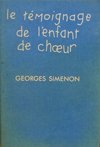 David Prestidge has fond memories of Le Témoignage de l’enfant de chœur by Georges Simenon, but he recalls that reading it for A Level French was more like hard work than pleasure. Detective Maigret is ill in bed with influenza, but has to decide if a young altar boy on his way to early morning service has seen a dead body, and also the apparent killer fleeing the scene. Maigret reminisces that he too, like young Justin, was once an altar boy and this empathy helps him reconstruct the crime. The 1946 short story is anthologised as The Altar Boy’s Testimony in Maigret’s Christmas.
David Prestidge has fond memories of Le Témoignage de l’enfant de chœur by Georges Simenon, but he recalls that reading it for A Level French was more like hard work than pleasure. Detective Maigret is ill in bed with influenza, but has to decide if a young altar boy on his way to early morning service has seen a dead body, and also the apparent killer fleeing the scene. Maigret reminisces that he too, like young Justin, was once an altar boy and this empathy helps him reconstruct the crime. The 1946 short story is anthologised as The Altar Boy’s Testimony in Maigret’s Christmas.
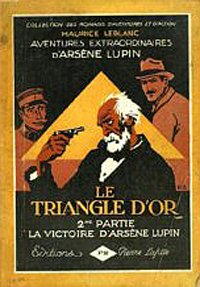 If there were a Gallic equivalent of Sherlock Holmes, he’d probably be Arsène Lupin. The major difference is that while Holmes is a gentleman detective Lupin is a gentleman thief. The Lupin stories were written by Maurice Leblanc, and David has chosen The Golden Triangle (1917) as his second recommendation. It’s set in Paris in 1915 and a wounded army captain becomes involved with a beautiful nurse. She has been mixing with the wrong sort, and we are drawn into a Byzantine plot involving bags of gold, seven crippled soldiers, a broken rosary bead, a rusty key and a Senegalese war hero who can strangle men with his one good hand. Enter the master of disguise and man of many aliases, Luis Peranna (take a close look at that name). It is, of course, Lupin and under his guidance good prevails and love triumphs. Be warned – this book is very much of its time, and full of racial stereotyping.
If there were a Gallic equivalent of Sherlock Holmes, he’d probably be Arsène Lupin. The major difference is that while Holmes is a gentleman detective Lupin is a gentleman thief. The Lupin stories were written by Maurice Leblanc, and David has chosen The Golden Triangle (1917) as his second recommendation. It’s set in Paris in 1915 and a wounded army captain becomes involved with a beautiful nurse. She has been mixing with the wrong sort, and we are drawn into a Byzantine plot involving bags of gold, seven crippled soldiers, a broken rosary bead, a rusty key and a Senegalese war hero who can strangle men with his one good hand. Enter the master of disguise and man of many aliases, Luis Peranna (take a close look at that name). It is, of course, Lupin and under his guidance good prevails and love triumphs. Be warned – this book is very much of its time, and full of racial stereotyping.
Buy now on Amazon
 Long time noir buff Rough Justice has opted for the violent and existential work of Jean-Patrick Manchette. In Three To Kill (1976), Manchette reveals his love of American jazz in the tale of a very unremarkable businessman, Georges Gerfaut, who rescues a man from a car accident but then realises that he has witnessed a murder. His humdrum life is then turned on its head as he finds himself a target for the killers. Originally titled Le Petit Bleu de la Côte Ouest, this is a compelling portrait of a civilised man forced to rely on his baser instincts to protect himself and his family. Manchette was a formidable political activist and was heavily involved in left wing protests during the 1960s war in Algeria.
Long time noir buff Rough Justice has opted for the violent and existential work of Jean-Patrick Manchette. In Three To Kill (1976), Manchette reveals his love of American jazz in the tale of a very unremarkable businessman, Georges Gerfaut, who rescues a man from a car accident but then realises that he has witnessed a murder. His humdrum life is then turned on its head as he finds himself a target for the killers. Originally titled Le Petit Bleu de la Côte Ouest, this is a compelling portrait of a civilised man forced to rely on his baser instincts to protect himself and his family. Manchette was a formidable political activist and was heavily involved in left wing protests during the 1960s war in Algeria.
Buy now on Amazon
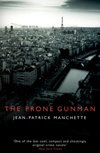 The Prone Gunman (1981) is Rough Justice’s second choice. Martin Terrier is a professional assassin – perhaps the best in Europe. His other life skills have, despite his best efforts, let him down and he is persuaded by his paymasters to take on one last job. Black, bitterly cynical, and uncomfortably realistic, this has proved to be a seminal and influential work. La Position du Tireur Couché was Manchette’s last major novel published in his lifetime. He worked on various other projects up until his death from cancer in 1995. A film based on the book is due out in 2015, and has an all-star cast including Idris Elba, Javier Bardem, Sean Penn, and Ray Winstone.
The Prone Gunman (1981) is Rough Justice’s second choice. Martin Terrier is a professional assassin – perhaps the best in Europe. His other life skills have, despite his best efforts, let him down and he is persuaded by his paymasters to take on one last job. Black, bitterly cynical, and uncomfortably realistic, this has proved to be a seminal and influential work. La Position du Tireur Couché was Manchette’s last major novel published in his lifetime. He worked on various other projects up until his death from cancer in 1995. A film based on the book is due out in 2015, and has an all-star cast including Idris Elba, Javier Bardem, Sean Penn, and Ray Winstone.
Buy now on Amazon
 MarinaSofia has stolen a march on us all, as she lives more or less ‘on the job’ in terms of appraising French crime fiction. Her first choice, Alex by Pierre Lemaitre, was nominated by other writers too, but let her take up the story. Commandant Camille Verhoeven is rather touchy about kidnappings. He lost his own wife to a gang of ruthless kidnappers. Now he has a new partner, a baby on the way, and all is rosy until the beautiful Alex Prévost is snatched from the street by a gang. A run of the mill kidnapping? Well yes, except that Alex is not missed by anyone. There are no ransom demands. There are no usual suspects. The tension mounts as Verhoeven attempts to find the woman and rescue his own career. Lemaitre shared the 2013 Crime Writers Association International Dagger with Fred Vargas. You can read the review here.
MarinaSofia has stolen a march on us all, as she lives more or less ‘on the job’ in terms of appraising French crime fiction. Her first choice, Alex by Pierre Lemaitre, was nominated by other writers too, but let her take up the story. Commandant Camille Verhoeven is rather touchy about kidnappings. He lost his own wife to a gang of ruthless kidnappers. Now he has a new partner, a baby on the way, and all is rosy until the beautiful Alex Prévost is snatched from the street by a gang. A run of the mill kidnapping? Well yes, except that Alex is not missed by anyone. There are no ransom demands. There are no usual suspects. The tension mounts as Verhoeven attempts to find the woman and rescue his own career. Lemaitre shared the 2013 Crime Writers Association International Dagger with Fred Vargas. You can read the review here.
Buy now on Amazon
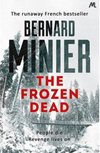 Next, Marina moves well to the south with a mystery set in the Pyrenees – The Frozen Dead by Bernard Minier. Diane Berg has a wonderful new job. Wonderful? Well. each to their own. She is the resident forensic psychologist in an asylum for the criminally insane, situated high above the snow line. Nearby, a dead horse is not just flogged, it is decapitated, and its cadaver suspended for all to see on a frozen mountainside. A millionaire energy boss, the obligatory serial killer, a mad scientist, and a cynical police chief add colour to a gripping and suspense-laden thriller.
Next, Marina moves well to the south with a mystery set in the Pyrenees – The Frozen Dead by Bernard Minier. Diane Berg has a wonderful new job. Wonderful? Well. each to their own. She is the resident forensic psychologist in an asylum for the criminally insane, situated high above the snow line. Nearby, a dead horse is not just flogged, it is decapitated, and its cadaver suspended for all to see on a frozen mountainside. A millionaire energy boss, the obligatory serial killer, a mad scientist, and a cynical police chief add colour to a gripping and suspense-laden thriller.
Buy now on Amazon
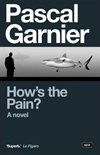 How’s The Pain by Pascal Garnier is the third, but in no way the least of Marina’s choices. Sadly, Garnier died in 2010 but he has left a distinctive legacy. Here a an aging professional assassin called Simon strikes up an unlikely friendship with a fairly gormless young man named Bernard. This book shares with The Prone Gunman one of the most enduring themes of crime fiction – the hitman’s last job. This in no way diminishes what is a fascinating novel, using black humour, sentiment, and social observation to make its point. Read our review here.
How’s The Pain by Pascal Garnier is the third, but in no way the least of Marina’s choices. Sadly, Garnier died in 2010 but he has left a distinctive legacy. Here a an aging professional assassin called Simon strikes up an unlikely friendship with a fairly gormless young man named Bernard. This book shares with The Prone Gunman one of the most enduring themes of crime fiction – the hitman’s last job. This in no way diminishes what is a fascinating novel, using black humour, sentiment, and social observation to make its point. Read our review here.
Buy now on Amazon
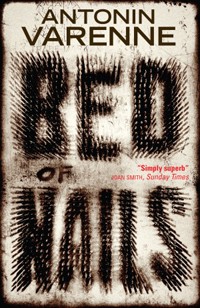 Raven opens her innings with Bed of Nails by Antonin Varenne. There is no quarter asked or given in this tale which includes the dark side of France’s capital, S&M shows, corrupt coppers and unexplained suicides. Inspector Guérin is consigned by fate, and an unfortunate career slip-up, to see out his days in a dead-beat job working in the suicide division among other cops who are either bent or useless. When an drug-addicted American exhibitionist apparently commits suicide during a live sex show, Guérin and his lugubrious assistant Lambert must wade through a cesspit of lies and deceit to get to the truth. The book was originally published in France as Fakirs in 2009. Siân Reynolds, who has also translated the novels of Fred Vargas, shares the billing here. MarinaSofia reviewed the book here, in 2013.
Raven opens her innings with Bed of Nails by Antonin Varenne. There is no quarter asked or given in this tale which includes the dark side of France’s capital, S&M shows, corrupt coppers and unexplained suicides. Inspector Guérin is consigned by fate, and an unfortunate career slip-up, to see out his days in a dead-beat job working in the suicide division among other cops who are either bent or useless. When an drug-addicted American exhibitionist apparently commits suicide during a live sex show, Guérin and his lugubrious assistant Lambert must wade through a cesspit of lies and deceit to get to the truth. The book was originally published in France as Fakirs in 2009. Siân Reynolds, who has also translated the novels of Fred Vargas, shares the billing here. MarinaSofia reviewed the book here, in 2013.
Buy now on Amazon
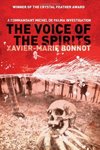 Xavier-Marie Bonnot is as Marseillais as bouillabaisse, and he has written a series of books set in his home city featuring Commandant Michel de Palma. Le pays oublié du temps was first published in 2011 and its translation The Voice of the Spirits is Raven’s second pick. The Commandant is faced with a murder mystery which has its roots 70 years earlier in one of the most primitive surviving human cultures – the tribal communities deep in the jungles of Papua New Guinea. Throw in art smugglers, haunted tribal masks, and unidentifiable murder weapon, and you have a thrilling yet sophisticated policier from one of France’s most distinctive writers.
Xavier-Marie Bonnot is as Marseillais as bouillabaisse, and he has written a series of books set in his home city featuring Commandant Michel de Palma. Le pays oublié du temps was first published in 2011 and its translation The Voice of the Spirits is Raven’s second pick. The Commandant is faced with a murder mystery which has its roots 70 years earlier in one of the most primitive surviving human cultures – the tribal communities deep in the jungles of Papua New Guinea. Throw in art smugglers, haunted tribal masks, and unidentifiable murder weapon, and you have a thrilling yet sophisticated policier from one of France’s most distinctive writers.
Buy now on Amazon
What’s your French crime favourite? Do add to our recommendations below.









An interesting list which I’ve added to my must reads.
One query. Are there any worthwhile crime novels set during the Revolutionary period?